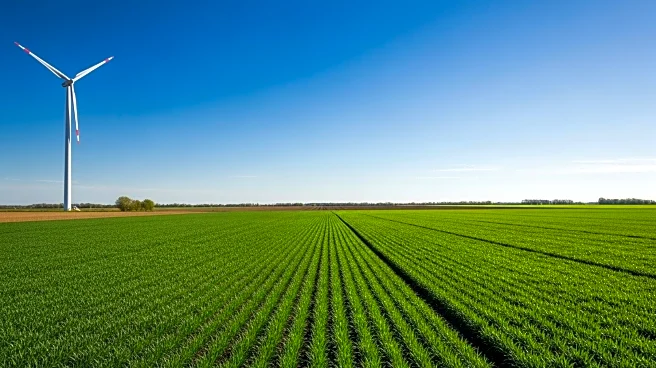What is the story about?
What's Happening?
The Nigerian government, through the Minister of Agriculture and Food Security, Abubakar Kyari, has unveiled a new agrifood investment plan aimed at promoting climate-smart farming. This initiative seeks to enhance food production, reduce greenhouse gas emissions, and create employment opportunities for farmers. The plan includes strategies such as distributing improved seeds, promoting sustainable soil management, and expanding agroforestry. It aligns with Nigeria's national policies and international commitments, including the Paris Agreement. The plan also emphasizes empowering smallholder farmers, particularly women and youth, with essential resources to improve agricultural productivity and resilience.
Why It's Important?
This investment plan is crucial for addressing the challenges faced by Nigeria's agriculture sector, which employs a significant portion of the population but struggles with low yields and climate vulnerability. By focusing on climate-smart practices, the plan aims to enhance food security and economic stability while contributing to global climate goals. The initiative also highlights the importance of integrating climate adaptation strategies into agricultural development, which could serve as a model for other countries facing similar challenges. The success of this plan could lead to increased investment in sustainable agriculture and improved livelihoods for rural communities.
What's Next?
The implementation of this plan will require collaboration between government agencies, international organizations, and local communities. Monitoring and evaluation mechanisms will be essential to assess the plan's impact and make necessary adjustments. The government may also need to address potential barriers such as access to finance and technology for smallholder farmers. As the plan progresses, it could attract further international support and investment, enhancing Nigeria's role in global efforts to combat climate change and promote sustainable development.
Beyond the Headlines
The plan's focus on empowering women and youth in agriculture underscores the broader social implications of sustainable development. By providing these groups with resources and opportunities, the initiative could contribute to gender equality and social inclusion. Additionally, the emphasis on ecosystem-based approaches and community-led solutions highlights the importance of local knowledge and participation in achieving sustainable outcomes.















